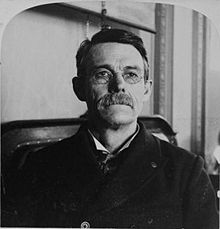Jerry Simpson
| Jerry Simpson | |
|---|---|

Jerry Simpson, c1898
|
|
| Member of the U.S. House of Representatives from Kansas's 7th district |
|
|
In office March 4, 1891 – March 3, 1895 |
|
| Preceded by | Chester I. Long |
| Succeeded by | Chester I. Long |
| Member of the U.S. House of Representatives from Kansas's 7th district |
|
|
In office March 4, 1897 – March 3, 1899 |
|
| Preceded by | Samuel R. Peters |
| Succeeded by | Chester I. Long |
| Personal details | |
| Born |
March 31, 1842 Prince Edward Island, Canada |
| Died | October 23, 1905 (aged 63) Wichita, Kansas |
| Political party | Populist |
Jeremiah Simpson (March 31, 1842 – October 23, 1905), nicknamed "Sockless Jerry" Simpson, was an American politician from the U.S. state of Kansas. An old-style populist, he was elected to the United States House of Representatives three times. He was a Georgist and former greenbacker.
Born in Prince Edward Island, Canada, Simpson moved with his family to Oneida County, New York when he was six. Although he did poorly in school, he was very intelligent and a voracious reader. During the Civil War, he served in the Illinois Volunteer Infantry, but was discharged for medical reasons.
After the war, Simpson moved to Indiana, where he signed on as a deckhand on a steamship that traversed the Great Lakes. By the time he had risen to the position of captain, he had married and started a family. Deciding to live a more stationary life, he moved to Jackson County, Kansas and bought a farm.
He married in 1870. In the late 1870s, a combination of hard times for farming in general and the death of his child in a sawmill accident drove Simpson to move south, to Barber County, Kansas, where he bought a ranch and a herd of cattle.
In late 1883 and early 1884, a long, hard winter killed his entire herd, and Simpson was reduced to working as the town marshal in Medicine Lodge, Kansas. It was during this time that Simpson, angry at his plight, first involved himself in politics, becoming an organizer for the Union Labor Party, a local offshoot of the defunct Greenback Party (of which he had been a member). He ran as their candidate for the state legislature in 1886 and 1888, but was defeated by the T. A. McNeal of the state's dominant Republican Party.
...
Wikipedia
